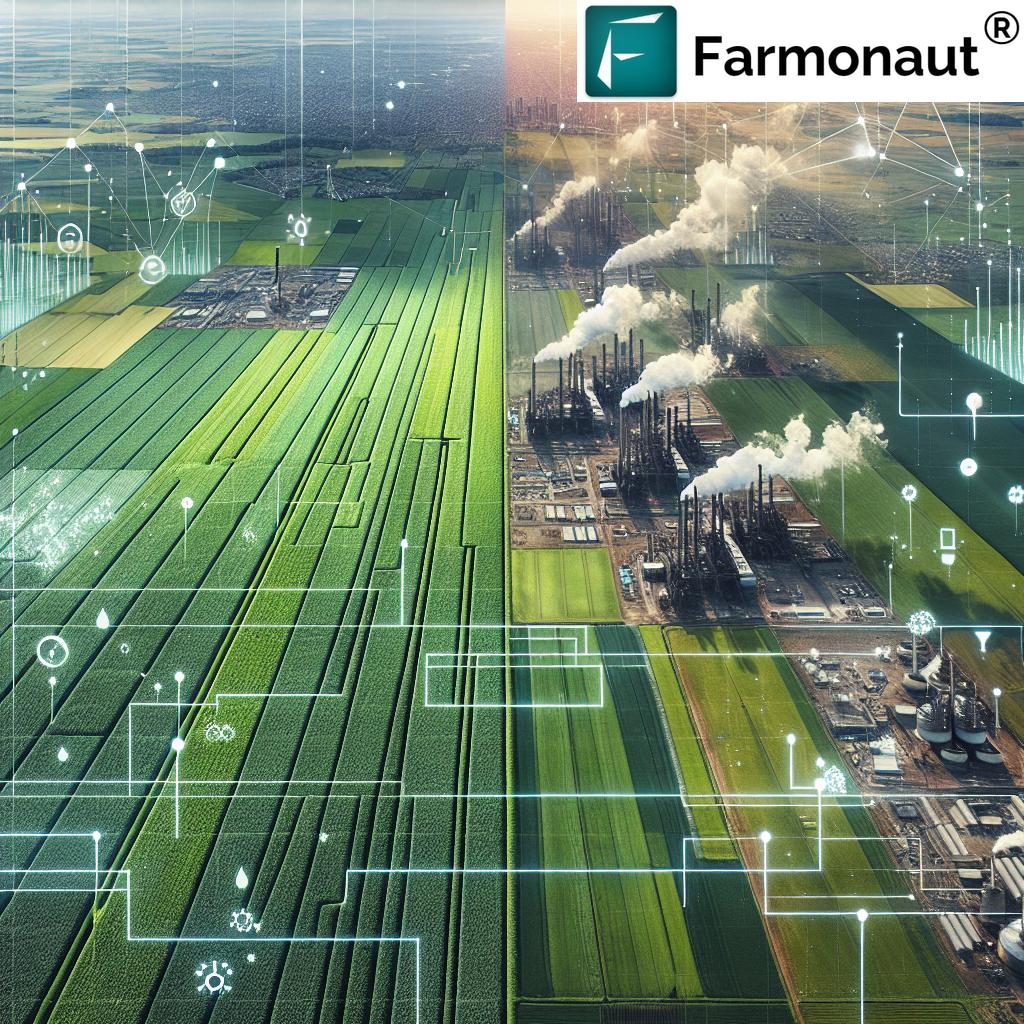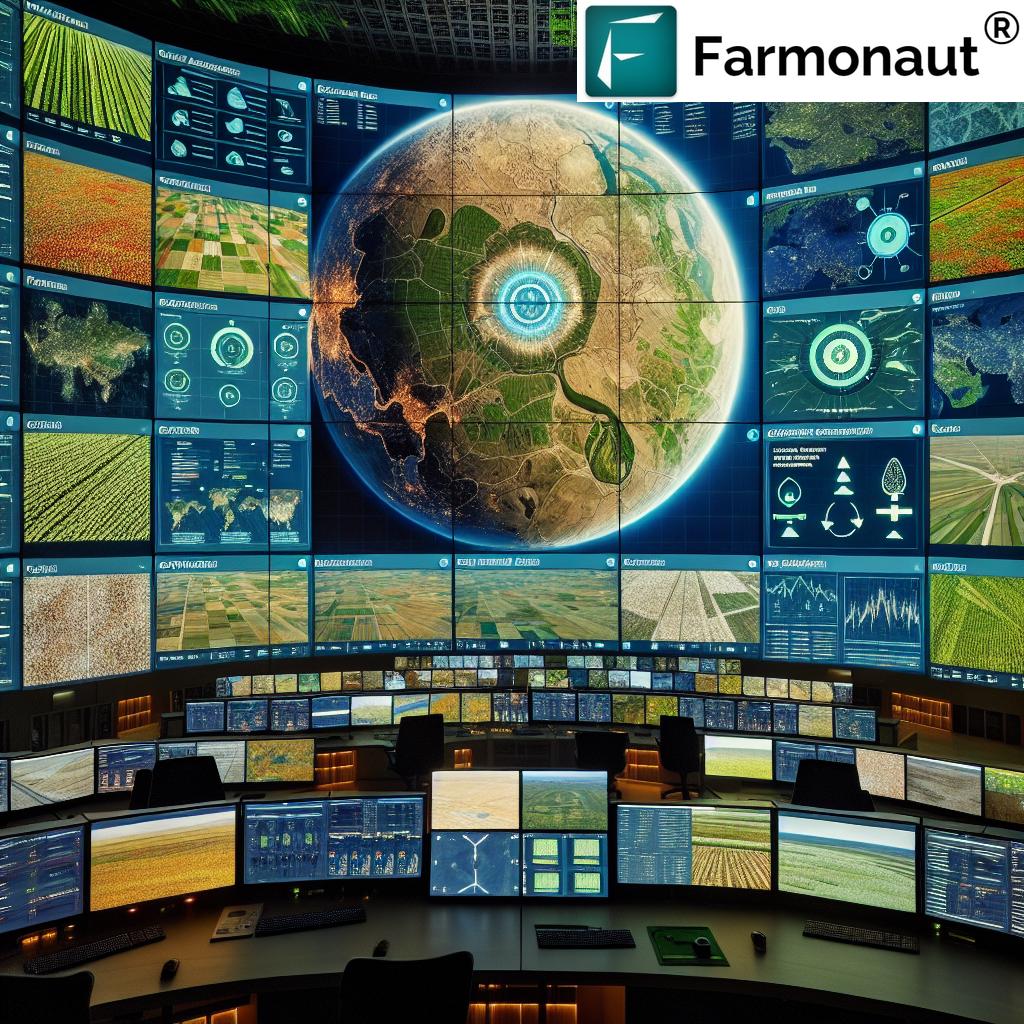Optimizing Agricultural Supply Chains: Lessons from Russia’s Chemical Industry and Global Food Security Implications
“Russia’s chemical industry impacts 80% of global fertilizer supply chains, affecting crop yields worldwide.”
In an era where global food security hangs in a delicate balance, we find ourselves at a critical juncture where the intricate connections between chemical factories, military supply chains, and agricultural productivity have come into sharp focus. Recent investigations have unveiled startling revelations about the Russian chemical industry’s role in sustaining both civilian and military operations, with far-reaching implications for agricultural supply chains worldwide. As we delve into this complex web of relationships, we’ll explore how these developments intersect with precision agriculture technology and sustainable farming practices, shaping the future of food production and distribution.
The Russian Chemical Industry: A Double-Edged Sword
A groundbreaking analysis by Reuters has shed light on the dual nature of Russia’s chemical sector. Several factories, linked to some of the wealthiest individuals in Russia, have been supplying critical ingredients for munitions used by Moscow’s military in the ongoing conflict in Ukraine. This revelation underscores the indirect yet significant role that five billionaires under Western sanctions—including Roman Abramovich and Vagit Alekperov—play in facilitating war efforts through the supply of vital chemical components for explosives.
The investigation revealed that these companies provided over 75% of the essential chemicals required by prominent explosives manufacturers in Russia from the onset of the invasion in February 2022 through September 2023. This startling statistic raises questions about the effectiveness of current sanctions and the complexities of global supply chains.

The Dual-Use Dilemma: Civilian vs. Military Applications
The chemical plants in question, while claiming to produce solely for civilian purposes, are inadvertently sustaining military operations. Experts like Anna Nagurney from the University of Massachusetts argue that these firms are not only supporting military endeavors but also earning crucial foreign currency from exports of civilian goods, including fertilizers. This dual-use nature of chemical products presents a significant challenge in distinguishing between legitimate civilian use and potential military applications.
To better understand the scale of this issue, let’s examine the data:
- Over 600,000 rail shipments of chemicals were analyzed
- Data was collected from two commercial databases
- Connections were established between billionaires’ companies and five sanctioned explosives factories
- Specific chemicals traced include acetic acid, nitric acid, and ammonium nitrate
These findings highlight the need for more nuanced approaches to sanctions and supply chain management, especially in sectors with dual-use potential.
Global Food Security: A Delicate Balance
The revelations about Russia’s chemical industry have significant implications for global food security. As a major producer of fertilizers, any disruption in Russia’s chemical output could have cascading effects on agricultural productivity worldwide. This situation underscores the importance of precision agriculture technology and sustainable farming practices in mitigating potential shortages and optimizing resource use.
At Farmonaut, we recognize the critical role that advanced agricultural technologies play in navigating these complex geopolitical landscapes. Our smart farming solutions offer valuable insights into industry trends, demonstrating how satellite imagery in agriculture and remote sensing for crop monitoring can enhance decision-making processes for farmers and policymakers alike.
The Role of Technology in Agricultural Resilience
“Satellite imagery in agriculture can increase crop monitoring efficiency by up to 40% compared to traditional methods.”
In light of the potential disruptions to global fertilizer supplies, the adoption of precision agriculture technologies becomes even more crucial. These innovations allow for more efficient use of resources, potentially reducing dependency on chemical fertilizers and mitigating the impact of supply chain disruptions.
Farmonaut’s platform leverages cutting-edge technologies to provide:
- Crop yield optimization through real-time monitoring and analysis
- Agricultural supply chain management tools for improved efficiency
- Fertilizer efficiency techniques to maximize output while minimizing input
- Agricultural data analytics for informed decision-making
These tools are essential for adapting to the changing landscape of global agriculture and ensuring food security in the face of geopolitical uncertainties.
Navigating Sanctions and Supply Chain Disruptions
The investigation into Russia’s chemical industry raises concerns about the effectiveness of Western sanctions. While the billionaires themselves are sanctioned, their companies have largely escaped stringent penalties or restrictions on importing critical goods from Western nations. This loophole allows for ongoing production critical for both military endeavors and civilian industries reliant on chemical products.
As the global community grapples with these complexities, there’s a growing call to reassess sanctions policies, particularly concerning supply chains supporting military production. However, any additional sanctions targeting chemical producers must be carefully weighed against potential negative effects on worldwide food security.
| Region | Chemical Industry Output | Fertilizer Availability | Crop Yield Impact | Food Security Risk |
|---|---|---|---|---|
| Russia | -5% | High | -2% | Low |
| Europe | -10% | Medium | -5% | Moderate |
| North America | +2% | High | +1% | Low |
| Africa | -15% | Low | -8% | High |
| Asia | -7% | Medium | -4% | Moderate |
This matrix illustrates the potential impacts of chemical industry disruptions on various regions, highlighting the interconnected nature of global agricultural supply chains and the importance of proactive measures to ensure food security.
The Future of Sustainable Agriculture
As we navigate these challenging times, the importance of sustainable farming practices and digital agriculture innovations cannot be overstated. Farmonaut’s commitment to making precision agriculture affordable and accessible aligns with the global need for resilient and efficient farming systems.
Our platform offers:
- Real-time crop health monitoring using satellite imagery
- AI-based advisory systems for optimized decision-making
- Blockchain-based traceability for transparent supply chains
- Resource management tools for efficient farm operations
Explore Farmonaut’s API for advanced agricultural insights
By leveraging these technologies, farmers and agribusinesses can better adapt to supply chain disruptions and optimize their operations for long-term sustainability.
The Road Ahead: Balancing Security and Sustainability
As the global community continues to grapple with the complexities of international relations, trade, and food security, it’s clear that a multifaceted approach is necessary. The revelations about Russia’s chemical industry serve as a stark reminder of the interconnected nature of our world and the potential for geopolitical events to have far-reaching consequences on agricultural supply chains.

Moving forward, we must focus on:
- Developing more resilient and diversified agricultural supply chains
- Investing in research and development of alternative fertilizers and sustainable farming methods
- Enhancing transparency and traceability in chemical and agricultural supply chains
- Promoting international cooperation to address food security challenges
Access Farmonaut’s API Developer Docs for integrating agricultural intelligence
By embracing innovative technologies and sustainable practices, we can work towards a more secure and resilient global food system. Farmonaut remains committed to supporting this vision through our advanced agricultural solutions and data-driven insights.
Conclusion: Navigating Complexity with Innovation
The intricate connections between chemical factories, military supply chains, and agricultural productivity highlighted in this analysis underscore the need for adaptive strategies in modern farming. As we’ve explored, the challenges posed by geopolitical tensions and supply chain disruptions can have significant impacts on global food security. However, they also present opportunities for innovation and improvement in agricultural practices.
Farmonaut’s smart farming solutions offer a pathway to navigate these complexities, providing farmers and policymakers with the tools needed to make informed decisions in an ever-changing landscape. By leveraging precision agriculture technology, satellite imagery, and data analytics, we can work towards a more resilient and sustainable global food system.
As we move forward, it’s crucial for stakeholders across the agricultural sector to stay informed about these industry trends and to embrace digital agriculture innovations. By doing so, we can work collectively towards optimizing agricultural supply chains, enhancing food security, and building a more sustainable future for global agriculture.
FAQ Section
Q: How does the Russian chemical industry impact global agriculture?
A: The Russian chemical industry plays a significant role in global fertilizer production. Any disruptions in this sector can affect fertilizer availability worldwide, potentially impacting crop yields and food security in various regions.
Q: What is precision agriculture technology?
A: Precision agriculture technology refers to farming management practices that use data analytics, satellite imagery, and IoT devices to optimize crop yields, reduce waste, and improve overall farm efficiency.
Q: How can satellite imagery benefit agriculture?
A: Satellite imagery provides farmers with valuable data on crop health, soil moisture, and field conditions. This information enables more precise decision-making in areas such as irrigation, fertilization, and pest management.
Q: What are sustainable farming practices?
A: Sustainable farming practices are methods that aim to meet current agricultural needs without compromising the ability of future generations to meet their own needs. These include techniques like crop rotation, reduced tillage, and efficient water management.
Q: How do digital agriculture innovations contribute to food security?
A: Digital agriculture innovations, such as AI-driven crop monitoring and blockchain-based supply chain management, help improve farm productivity, reduce waste, and enhance transparency in food production and distribution.






